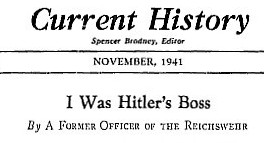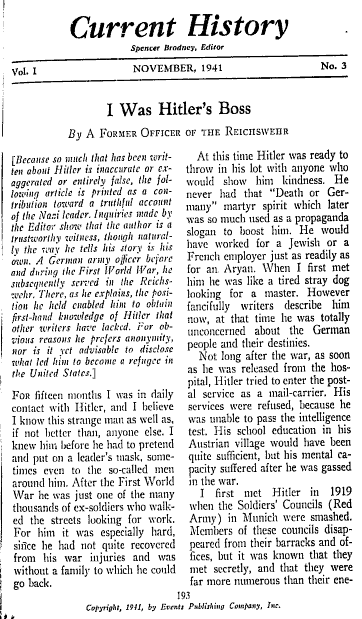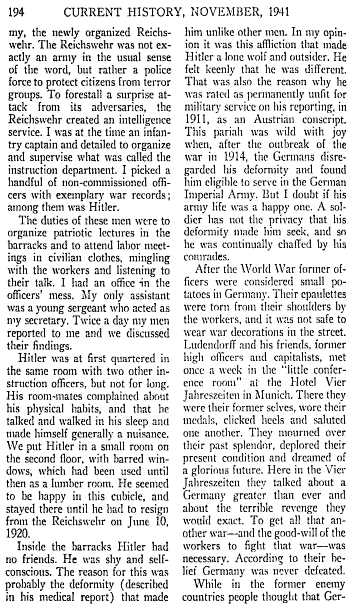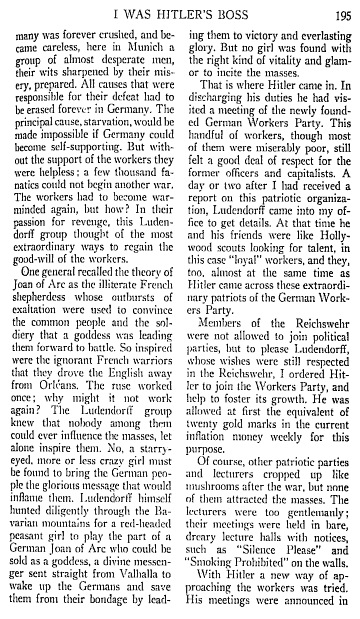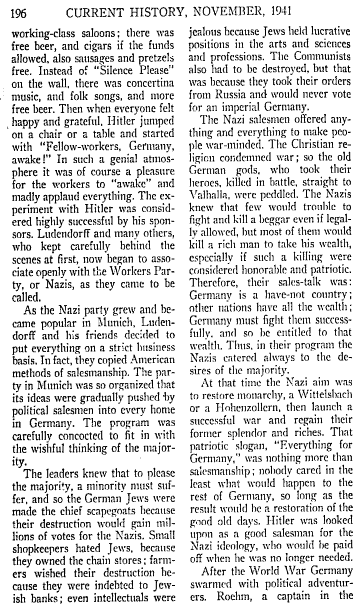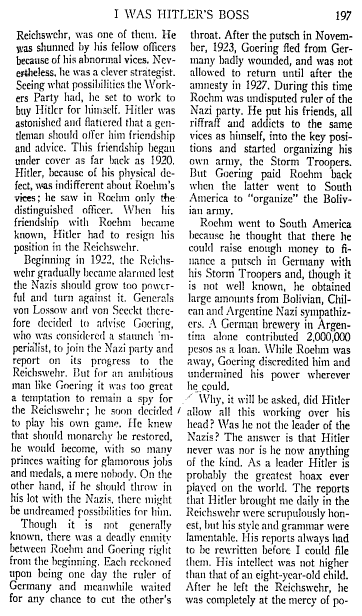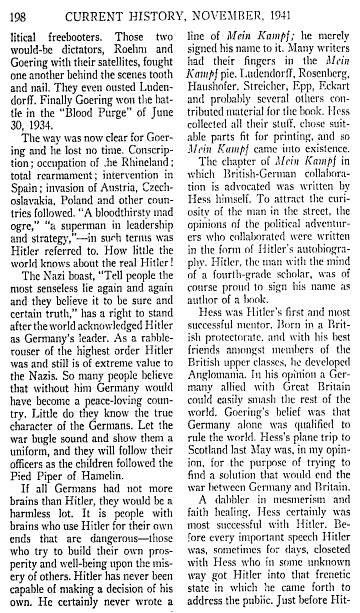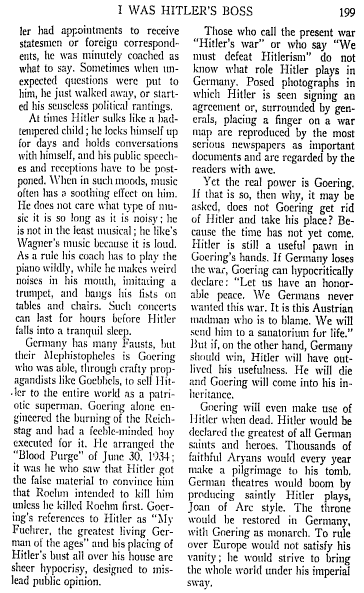| Links
(back to top)
- A US
army secret service source book on Hitler contains a summary of
this article (text
and scans at Nizkor.org)
- The H-German
version of Hitler's first documented writing about the "Jewish
question", a Sept. 16, 1919 answer to an inquiry, contains
the following in its intoductory text:
"Because antisemitism
had not played a notable part in Bavarian politics prior to the revolutionary
disturbances, a Herr Adolf Gemlich was prompted to send an inquiry about
the importance of the "Jewish question" to Captain Karl Mayr,
the officer in charge of the Reichswehr News and Enlightenment Department
in Munich. Mayr referred him to Hitler, who had distinguished himself
in the above-mentioned course by the vehemence of his radical nationalist
and antisemitic views, and by his oratorical talents. Hitler was already
feeling his way toward a political career; four days before responding
to Gemlich in the letter translated below, he had paid his first visit
to the German Workers' Party (eventually renamed, the National Socialist
Workers' Party) as a confidential agent of the Reichswehr. In the letter
to Gemlich he appears anxious to establish his credentials as a knowledgeable
and sober antisemite."
- Walter S. Frank's Adolf
Hitler: The Making of a Fuhrer (published only on-line at smoter.com),
contains the following text, referencing Richard Hanser, Putsch
(1971), 189; Maser 104-7; Charles B. Flood, Hitler: The Path to
Power (Boston: Houghton Mifflin, 1989), 63:
'Because the majority
of the troops the students would be speaking to were of the "less
educated," without University induced "sophistication and
depth," the students were taught to deliver their talks in an easily
comprehendible form which could be understood by everyone. They were
taught to appeal to nationalistic and patriotic feelings held by the
majority of Germans. Hitler was being trained to fashion clear and inventive
dialogues, dialogues which liberate what is already in most people's
minds.
Shortly after the classes began, one of Hitler's lecturers, Professor
Karl Alexander von Muller, would be the first to notice Hitler among
the crowd. Von Muller later described his first impression of Hitler:
"My lecture and the lively discussion that followed it were over
and the students had already begun to leave when my attention was caught
by a small group of people in the hall. They were standing spellbound
round a man who was vehemently haranguing them in a curiously guttural
voice and with ever mounting passion. I had the peculiar feeling that
he was feeding on the excitement he himself had whipped up. His face
was pale and thin, his forehead partially concealed by an unmilitary
lock of hair. He wore a close-cropped mustache and his striking large,
clear-blue eyes had a cold passion in them."*
At the next class, Captain Karl Mayr, the General Staff officer in charge
of the soldier-speaker program, was present. The Professor asked Captain
Mayr if he was aware that he had among his students "a natural-born
speaker." The Captain asked who the person was, and the professor
pointed to Hitler.
"That's Hitler from the List Regiment," the Captain said and
called out, "You Hitler, come up here."
The Professor remembered that Hitler, still ill at ease among superiors,
approached the Captain "awkwardly, with a kind of defiant embarrassment."*[Hanser,
189] Nothing came of the talk between Mayr and Hitler immediately, but
Hitler was beginning to attract attention.
During the last days of June, Hitler sat in class listening to von Muller's
version of history in which the German's were exalted as a "master
race." Because Hitler had been exposed to such teaching in Austrian
schools, and since Europe was alive with nationalistic fervor, he took
offense when after von Muller's speech, a student delivered a speech
protesting the professor's negative version of the Jews. Hitler, therefore,
entered his name "as wishing to take part in the discussion,"*
and when he got his turn to speak, he defended the professor's opinion
with such passion that he held his audience and swayed it. This was
Hitler's first and self admitted "anti-Semitic" speech, and
as he would later write: "The overwhelming majority of the students
present took my standpoint."*'
(see also Frank's bibliography,
which has a blurb about him at the end)
- ThirdReich.net's
Was Hitler Gay page contains the following text from a Nov. 2001
History Today article about Lothar Machtan's book The Hidden
Hitler:
"There is evidence to suggest that, after the campaign against
him, Röhm abandoned his hitherto steadfast loyalty to Hitler and
decided to pursue a policy of his own. For this he needed allies, spies
and informants. As early as April 1931 he had instructed the agent Georg
Bell to build up an SA intelligence service. All this entailed at first
was the intimidation of 'politicians inside the NSDAP who wanted to
exploit Röhm's predicament'. But after the publication of the 'Röhm
letters', he came to terms with opposition forces. Bell arranged a meeting
with a former Reichswehr comrade of Rohm, the one-time intelligence
officer Karl Mayr, who had since joined the SPD. With
his help, the SA commander tried to track down the real authors of the
campaign against him."
- Rictor Norton's Nazi
Persecution of Homosexuals page includes the following:
"Hitler knew of Röhm's homosexuality at least by 1927, as
well as that of others such as Edmund Heines, Karl Ernst, and La Paz,
who owed their promotions to their "services" to Röhm.
Heines would scour Germany picking up boys for his commander, and the
clique met often in Munich for orgies.
But Hitler was not yet strong enough in his own right either to quash
his rival (Röhm lead a 100,000-strong army) or to maintain power
without his help. He wisely decided to come to Röhm's defence:
'His private life cannot be an object of scrutiny unless it conflicts
with basic principles of National Socialist ideology.'
When Röhm's army grew to 500,000 men by 1932, Hitler saw a threat
and decided that Röhm's private life did so conflict. Party Judge
Walter Buch arranged for the assassination of the gay leaders of the
SA: Röhm, Count Du Moulin, Eckhart, George Bell, Stabsführer
Uhl. But the plot was discovered, Buch was denounced, and Röhm
and Bell fled to their friend Major Karl Mayr to find
out who was behind the conspiracy."
- The UK Spartakus Schoolnet
site's Hitler page contains the following mention of Mayr:
"The German
Army also began using Hitler as a spy. In September 1919, he was instructed
to attend a meeting of the German Worker's Party (GWP). The army feared
that this new party, led by Anton Drexler, might be advocating communist
revolution. Hitler discovered that the party's political ideas were
similar to his own. He approved of Drexler's German nationalism and
anti-Semitism but was unimpressed with the way the party was organized.
Although there as a spy, Hitler could not restrain himself when a member
made a point he disagreed with, and he stood up and made a passionate
speech on the subject.
Drexler was impressed with Hitler's abilities as an orator and invited
him to join the party. At first Hitler was reluctant, but urged on by
his commanding officer, Captain Karl Mayr, he eventually agreed. He
was only the fifty-fourth person to join the GWP. Hitler was immediately
asked to join the executive committee and was later appointed the party's
propaganda manager."
- R.H. Perez de Cruet's Holocaust
Project's "selected biographies" M page contains the following
entry:
"MAYR, KARL (18??-1945) Bavarian General Staff officer and Hitler's
immediate superior in an Army Intelligence Division, 1919-1920. He later
became Hitler's opponent, and wrote in his memoirs that it was General
Ludendorff who had personally ordered him to have Hitler join the Nazi
party and build it up. He was murdered in Buchenwald concentration camp
in 1945."
|
